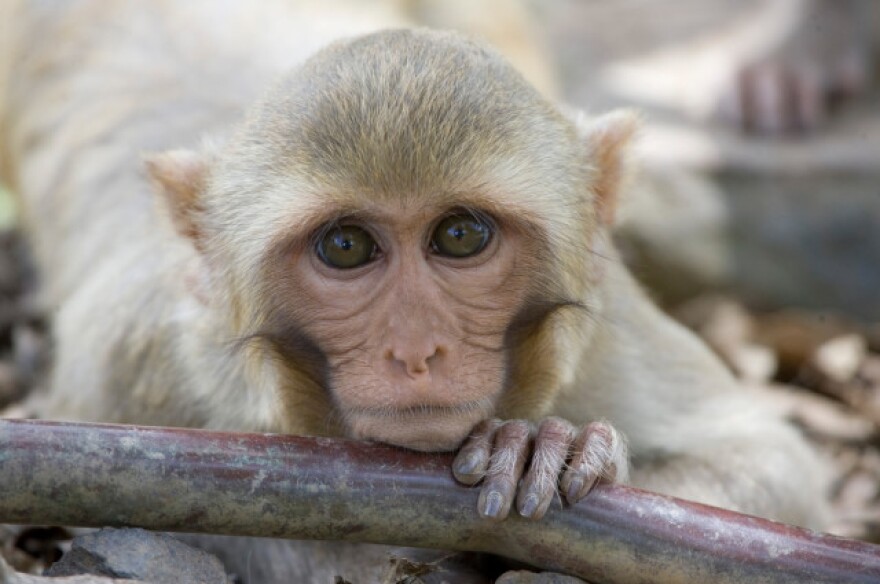Oregon Health Sciences University--OHSU--has released the list of problems itŌĆÖs experienced in its animal research centers over the last 16 months.
They range from the disturbing: a monkey bleeding to death after pulling out its shunt ŌĆö to the bizarre: another monkey drinking so much alcohol it passed out.
OHSUŌĆÖs primate research center has about 5,000 monkeys. And at any one time, scientists there are conducting about 120 experiments.
Center director Nancy Haigwood says mistakes happen.
Nancy Haigwood: ŌĆ£They happen for the same reason that mistakes happen in a hospital.ŌĆØ
A recent study found medical mistakes are the third-leading cause of death in the nation.
Nancy Haigwood: ŌĆ£People make mistakes from time-to-time, weŌĆÖre not perfect. WeŌĆÖre trying to be. We certainly always want to provide the best care and best procedures for our animals, just as we would for our dogs or our children. But sometimes, things arenŌĆÖt perfect.ŌĆØ
Last year, according to documents acquired by a ŌĆśFreedom Of InformationŌĆÖ request from an animal rights group, there were eight serious problems last year, and one so far this year.
OHSU provided OPB with the documents before sending them to ŌĆśStop Animal Exploitation Now,ŌĆÖ saying it wants the general public to get a better idea of what itŌĆÖs doing.
The problems over the last 16 months vary in severity from two mice dying after being injected with the wrong solution, to a monkey getting drunk.
Haigwood says in that case, the monkey was in an experiment on alcoholic relapse.
Animals are given a choice of water or alcohol. Some are tea totalers, others binge. This particular monkey hadnŌĆÖt been allowed to drink alcohol for 28-days.
Nancy Haigwood: ŌĆ£And it basically overdosed, it drank too much and passed out in the cage. Was found, reported to the veterinary staff and resuscitated.ŌĆØ
The problem was reported to OHSUŌĆÖs internal oversight committee. It worked with researchers to make sure it doesnŌĆÖt happen again by limiting alcohol intake after an abstinence.
Michael Budkie with Ohio-based ŌĆśStop Animal Exploitation Now,ŌĆÖ ridiculed the experiment saying we can all guess what an alcoholic monkey might do after a long dry spell.
He says according to the ŌĆśNational Institutes of Health,ŌĆÖ OHSU gets more than $5 million dollars a year to do alcohol studies on primates.
Budkie: ŌĆ£IŌĆÖm very offended by the fact that our federal government is currently using that much money just at OHSU, let alone all of the other laboratories, to preform drug addiction experiments on animals, when we have treatment programs for human beings that work. That are not receiving adequate funding.ŌĆØ
OHSU says itŌĆÖs trying to unravel the complex biological factors involved in alcohol addiction.
Budkie says he plans to file another complaint against OHSU after learning about the alcoholic monkey experiment and the other problems experienced over the last 16 months.
Earlier this year, the U.S. Department of Agriculture confirmed that it is investigating the treatment of research monkeys at OHSU.
The feds wouldnŌĆÖt outline why, but over the last two years, the center has been warned about monkeys being burned by heating pads; dying from respiratory distress and in fights.
OHSU entered into a settlement with the USDA four years ago, and two years ago, got a warning letter,
Budkie wants to see the primate center shut down.
Michael Budkie: ŌĆ£If research facilities are so inept that they cannot follow basic procedures and are accidentally killing animals during experiments, what does that say about the ability of these facilities to perform research that actually has any scientific relevance.ŌĆØ
Back at the primate center, attending veterinarian Gregory Timmel says the people who work day-to-day with research animals care deeply:
Gregory Timmel: ŌĆ£And that human animal bond is a very powerful thing. And we know these animals and they have different personalities and they have different likes and dislikes, just like we do or just like our pets do. And we take that very serious and occasionally when something doesnŌĆÖt go right, and something happens, weŌĆÖre devastated by that.ŌĆØ
The law states that animals are not allowed to feel pain, they have to be given analgesics to relieve pain.
Members of the public can ask to tour the primary center, but OHSU can deny access.
[Kristian Foden-Vencil is a reporter for Oregon Public Broadcasting]


